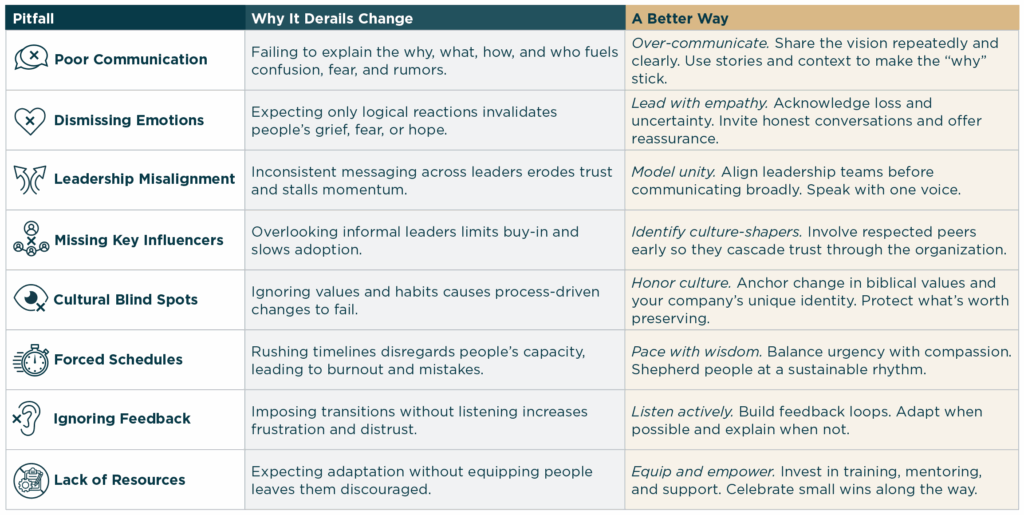Change Management as People Stewardship
A Christian Perspective on Leading Change
If you’ve ever tried to lead change in your business, you know the tension. On paper, the initiative makes sense—streamlined systems, healthier culture, stronger strategy. But when you announce it, the air shifts. Questions ripple through the room:
Do I have the skills for what’s coming?
Will my role still matter?
Is this just another passing idea?
That sinking feeling is familiar to many leaders. You know the change is necessary, maybe even God-directed, yet instead of energy and momentum, you’re met with hesitation or resistance.
It’s in these moments that we realize change is more than processes, systems, or structures. It’s about people. For Christian leaders, this means that change management is an act of stewardship.
What Change Management Really Is
When change occurs, employees feel it: the loss of something familiar, the fear of failure, and the uncertainty of what the future holds for them. Leaders who ignore those emotions often find themselves facing disengagement, distrust, or high turnover rates. Leaders who acknowledge them, however, build something far more valuable: resilience.
Think about the last significant change you led. Did your team walk away more anxious and guarded or more trusting and engaged? The difference lies in how you shepherd people through the process.
Change management, then, is really an opportunity to steward both progress and people. And for Christian leaders, that stewardship takes on a deeper meaning.
Why Christian Leaders Carry This Weight Differently
Secular business advice often reduces change management to getting compliance. Convince, align, execute. However, Christian leaders are called to something deeper.

The word company comes from the Latin com (“with”) and panis (“bread”)—literally, those who share bread.
That definition captures a biblical reality: our companies are communities. When communities face disruption, our responsibility is to guide the plan and shepherd the people.
Jesus called Himself the Good Shepherd (John 10:11), the one who goes before His sheep and calls them by name. If that’s the model of leadership we follow, then leading change cannot be reduced to Gantt charts and slide decks. Instead, we embrace patience when others are afraid, clarity when the future feels cloudy, and courage to walk with people through endings into new beginnings.
The Pitfalls That Derail Leaders—and How to Avoid Them
Even well-intentioned leaders can derail change efforts through predictable missteps that undermine trust and momentum. Understanding these common pitfalls can help us anticipate challenges and navigate them more effectively. By recognizing these patterns early, we can shift from reactive damage control to proactive change stewardship.
The table below highlights the eight most common pitfalls of change management, accompanied by practical, biblically minded alternatives.

Even when we avoid these pitfalls, the pace and volume of ongoing initiatives can wear teams down. Over time, constant transition creates change fatigue, which often shows up as:

The encouraging news? Change fatigue is recoverable. Consistency is key. When leaders demonstrate, through action, that change will be handled with clarity, empathy, and support, trust can be rebuilt, and resilience can grow.
When Resistance Becomes Resilience
C12 member Sam Thevanayagam, CEO of Parts Life, Inc. and DeVal Lifecycle Support, inherited a 70-year-old company weighed down by outdated systems and skepticism. Employees expected top-down mandates, but Sam chose a different path. By listening, equipping, and shepherding people through change, he turned resistance into resilience and built trust that outlasted the transition.
Change will always test leaders. It exposes our blind spots and stirs our teams’ anxieties. It’s also one of the greatest opportunities to model faith, courage, and care. James 1:3 tells us that the testing of our faith produces perseverance. Change is one of those tests. Handled poorly, it drains people and fractures trust. Handled faithfully, it develops resilience, deepens unity, and points people to the God who makes all things new.
Change is inevitable. The question is how you’ll steward it. Will your people emerge weary or wiser, struggling or stronger? The way you lead today shapes the story they’ll tell tomorrow.
Your Next Step
Whether you’re stepping into change, navigating through it, or emerging from it, every season of change is an opportunity to gain wisdom, grow resilience, and strengthen the muscles of leadership.
That’s why we’re bringing together Patrick Lencioni, best-selling author and organizational health expert, and C12 CEO Mike Sharrow for a powerful joint webinar on how to lead change with wisdom, resilience, and faith.
At its core, change management is about stewarding people—and that is one of the highest callings of Christian leadership. As you pursue growth in wisdom and faith, may you be strengthened to lead people well and guide change with grace—all for God’s glory.
C12 Business Forums provides an architected environment for Christian business leaders that integrates work, life, and leadership transformation. To learn more about C12’s approach to Christ-centered business leadership, find a C12 Business Forum near you.
November 3, 2025






